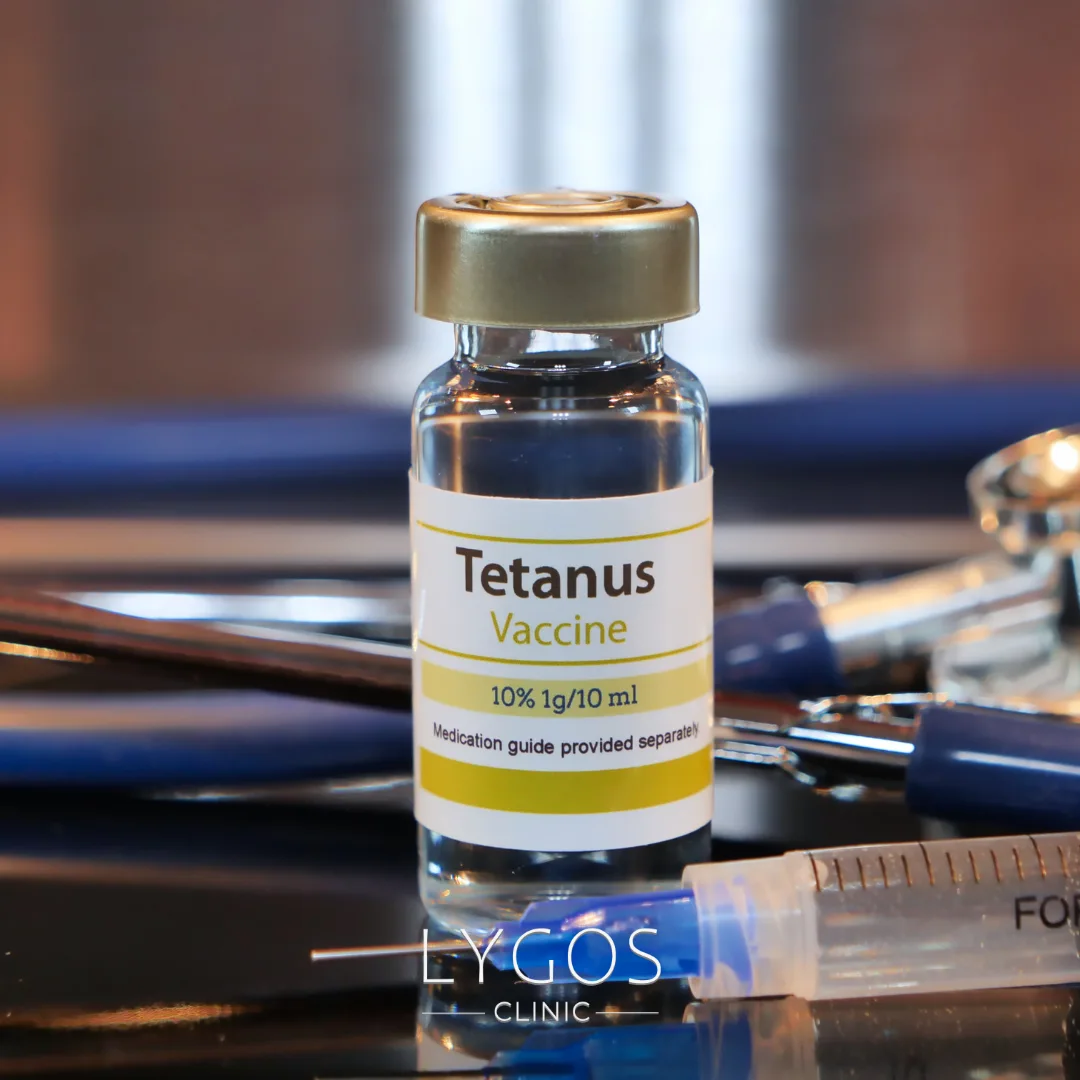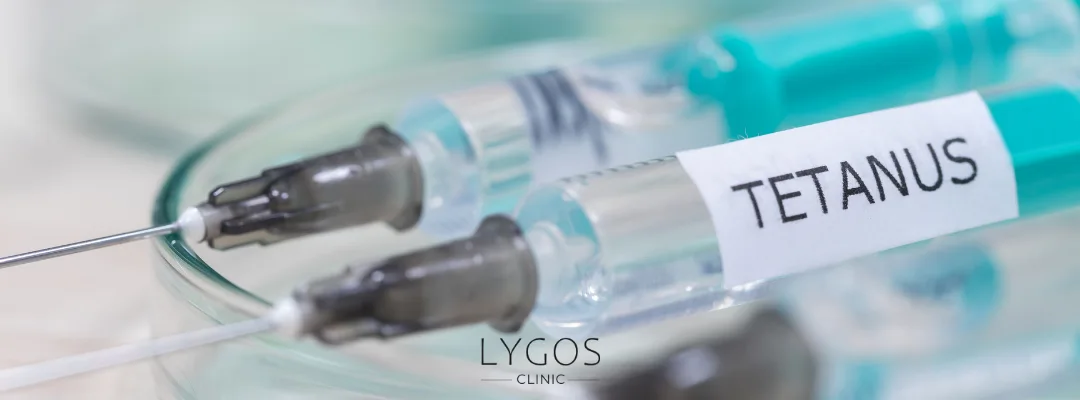Tetanus Vaccine | Side Effects of the Tetanus Vaccine

Chose Your Topic
Tetanus Vaccine
Tetanus is a serious infectious disease that can be fatal and affects the nervous system. The toxins produced by the Clostridium tetani bacterium cause involuntary muscle contractions and stiffness. This bacterium is commonly found in environments such as soil, dust, and animal feces and can enter the body through open wounds.
The tetanus vaccine is one of the most effective methods of protection against this dangerous disease. Gaining immunity through regular vaccination is crucial for preventing the disease. So, what is the tetanus vaccine, how is it administered, and who should receive it? Here are all the details you need to know.

What is the Tetanus Vaccine?
The tetanus vaccine is a vaccine used to prevent tetanus, a disease caused by the bacterium Clostridium tetani. Tetanus is an infection that can cause muscle spasms, nervous system disorders, and, in severe cases, death. The bacterium is particularly found in soil, animal feces, and rusty surfaces. It enters the body through small cuts, punctures, or wounds, releasing toxins that damage the nervous system.
The tetanus vaccine stimulates the immune system, providing protection against this bacterium. It is usually included in combination vaccines (DTaP, Tdap, Td) that also protect against other diseases. The tetanus vaccine should be administered at specific intervals during both childhood and adulthood.
Thanks to the tetanus vaccine, the disease has been largely controlled. The risk of infection is significantly higher in individuals who are not vaccinated. Tetanus treatment is complex and difficult, so preventing the disease before it occurs is the best approach.
In some countries, the tetanus vaccine is included in mandatory vaccination programs. The World Health Organization (WHO) and many health organizations emphasize the necessity of the tetanus vaccine. Although tetanus is not contagious, it can have fatal consequences if personal protection is not ensured.

What Are the Side Effects of the Tetanus Vaccine?
The tetanus vaccine is generally safe and rarely causes serious side effects. However, some individuals may experience the following mild to moderate side effects:
- Redness, swelling, or pain at the injection site
- Mild fever
- Fatigue and weakness
- Headache
- Muscle pain
In rare cases, individuals with hypersensitivity may experience allergic reactions (anaphylaxis). Although such cases are extremely rare, if any severe side effects occur, a healthcare provider should be consulted immediately.
Additionally, some individuals may develop mild flu-like symptoms on the day of vaccination. This is related to the immune system’s response and usually resolves on its own within a short period.
How Long Does the Tetanus Vaccine Last?
The tetanus vaccine should be repeated at regular intervals. While it is administered according to a vaccination schedule during infancy and childhood, adults are recommended to receive a booster dose every 10 years.
The protective effect of the vaccine lasts for approximately 10 years. If an individual sustains a wound that poses a risk of tetanus and more than five years have passed since their last tetanus vaccine, an additional dose may be necessary. Therefore, it is important to receive booster doses before the tetanus vaccine expires.
For pregnant women, the tetanus vaccine is highly important for protecting the baby. Vaccination during pregnancy protects both the mother and the newborn from tetanus. Additionally, in some countries, individuals in high-risk occupations receive the tetanus vaccine more frequently.
When Should the Tetanus Vaccine Be Administered?
The tetanus vaccine is included in routine childhood vaccination programs. The vaccination schedule is generally as follows:
- 2 months: First dose of tetanus vaccine
- 4 months: Second dose of tetanus vaccine
- 6 months: Third dose of tetanus vaccine
- 18 months: Fourth dose of tetanus vaccine
- 4-6 years: Fifth dose (before starting school)
For adults, a tetanus vaccine booster dose should be administered every 10 years. Additionally, if an individual sustains a wound that poses a risk of tetanus and their last vaccination was more than five years ago, an additional dose may be given.

Who Should Receive the Tetanus Vaccine?
The tetanus vaccine provides significant protection for everyone. It should be specifically administered to the following groups:
- Infants and children: The tetanus vaccine should be administered according to the national vaccination schedule.
- Adults: A booster dose of the tetanus vaccine should be administered every 10 years.
- Pregnant women: The tetanus vaccine administered during the 2nd or 3rd trimester protects both the mother and the baby.
- Individuals with open wounds: If more than five years have passed since the last tetanus vaccine, an additional dose is necessary.
- Healthcare workers: Medical personnel working in hospitals and clinics should be regularly vaccinated against tetanus.
- Soldiers and farmers: Individuals in occupations involving frequent contact with soil or animals should receive the tetanus vaccine regularly.
Although tetanus is a preventable disease, it is a dangerous infection that can cause serious complications and even death. The tetanus vaccine is the most effective method of protection against this disease and should be administered according to the recommended vaccination schedule.
Every individual should track their tetanus vaccine history and receive booster doses as needed. Special attention should be given to open wounds, and in cases of tetanus risk, a healthcare provider should be consulted without delay.
To stay healthy and safe, the tetanus vaccine should not be neglected and should be regularly updated.
Tetanus Vaccine Frequently Asked Questions (FAQ)
In many countries, the tetanus vaccine is included in routine vaccination programs and is mandatory, especially for children. Adults are also advised to keep their vaccinations up to date.
Although the vaccine provides strong protection, immunity can decrease over time. That’s why booster doses every 10 years are necessary.
If you have a deep or contaminated wound and it has been more than five years since your last tetanus shot, you should get a booster dose as soon as possible.
Yes, pregnant women should receive the tetanus vaccine, typically during the second or third trimester, to protect both themselves and their baby.
Most side effects are mild, such as redness or swelling at the injection site. Severe allergic reactions are extremely rare but should be treated immediately.


